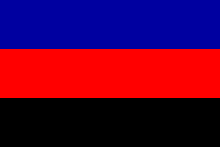
Back كاربونيريا Arabic Карбанарый Byelorussian Карбанары BE-X-OLD Carbonaris Catalan کاربۆناری CKB Karbonáři Czech Carbonari German Καρμπονάροι Greek Carbonarios Spanish Ikazkinak Basque
 Masonic emblem of the Carboneria | |
 Carbonari triband | |
| Formation | Early 19th century |
|---|---|
| Type | Conspiratorial organisation |
| Purpose | Italian unification |
| Location | |
Key people | Gabriele Rossetti Louis-Napoléon Bonaparte Giuseppe Garibaldi Silvio Pellico Aurelio Saffi Antonio Panizzi Giuseppe Mazzini Ciro Menotti Melchiorre Gioia Piero Maroncelli |
The Carbonari (lit. 'charcoal burners') was an informal network of secret revolutionary societies active in Italy from about 1800 to 1831. The Italian Carbonari may have further influenced other revolutionary groups in France, Portugal, Spain, Brazil, Uruguay, the Ottoman Empire, and Russia.[1] Although their goals often had a patriotic and liberal basis, they lacked a clear immediate political agenda.[2] They were a focus for those unhappy with the repressive political situation in Italy following 1815, especially in the south of the Italian Peninsula.[2][3] Members of the Carbonari, and those influenced by them, took part in important events in the process of Italian unification (called the Risorgimento), especially the failed Revolution of 1820, and in the further development of Italian nationalism. The chief purpose was to defeat tyranny and establish a constitutional government. In the north of Italy other groups, such as the Adelfia and the Filadelfia, were associate organizations.[2][3]
- ^ Galt 1994.
- ^ a b c Mack Smith 1988.
- ^ a b Duggan 2008.